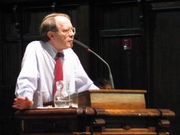|

Jonathan Kozol is
a non-fiction writer, educator, and activist, best know for his books on public
education in the US. During the civil rights campaigns of 1964 and 1965 Kozol
moved from Harvard Square to Roxbury, MA and became a fourth grade teach in the
Boston Public Schools. It was after he was fired from the Boston Public Schools
for reading Langston Hughes poetry to his class that he was thrust into the
limelight and become a more prominent figure on the Boston civil rights scene.
After being fired from BPS he was offered a job to teach for Newton Public
Schools, the school district that he had attended as a child, and taught there
for several years before becoming more deeply involved in social justice work
and dedicating more time to writing.
Jonathon Kozol on Educational Advocacy
|
